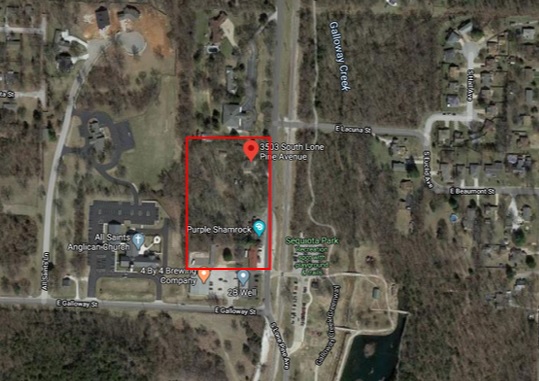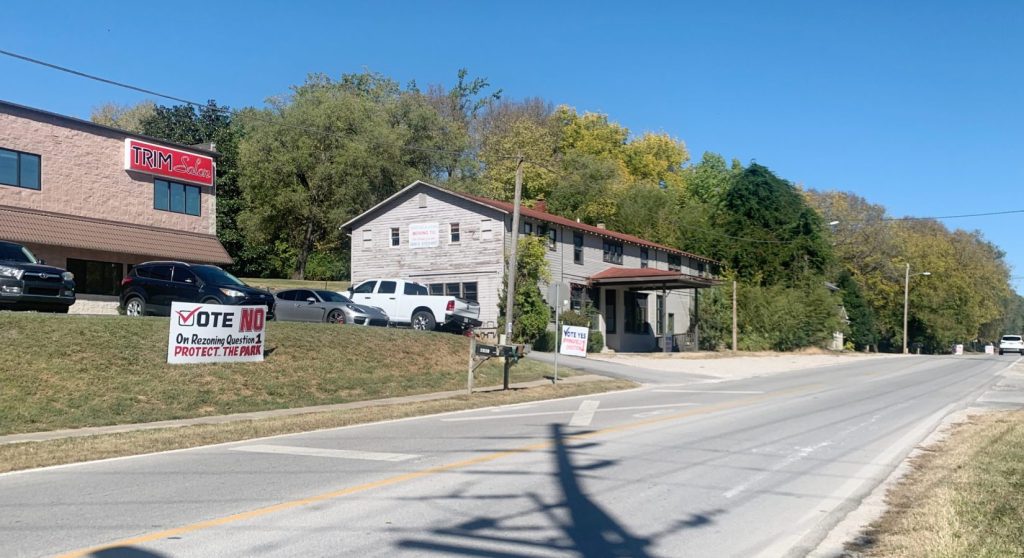Voters handed a Springfield developer a 40-point loss in a referendum zoning election Nov. 8, but that may or may not mean the dispute over what should be done with property in Galloway Village is settled.
Question 1, a ballot request to rezone 4.2 acres of property on Lone Pine Avenue west of Sequiota Park unofficially failed by 19,108 votes — 32,862 “No” votes to 13,754 “Yes” votes. Greene County Clerk Shane Schoeller is in the process of officially certifying the results of the general election.
Developers Mitchell and Amanda Jenkins from Elevation Enterprises and a political action committee called Springfield United campaigned for “Yes” votes, and the Galloway Village Neighborhood Association campaigned for “No” votes. The developer planned to build 90 apartment units, “really nice residential loft apartments,” in two buildings, and between 8,000-9,000 of rentable commercial space. Jenkins touted an acre of green space incorporated into the site plan as a key selling point.
Repeated efforts to contact Jenkins in the wake of the election have not been successful. In a campaign video published on Facebook on Nov. 7, Jenkins hinted at some possibilities for what could happen in Question 1 didn’t pass muster with Springfield voters.
“We just have to understand that this property is going to be developed, whether it’s our plan or somebody else’s, and anytime a development occurs, there is going to be more traffic than there previously was,” Jenkins said.
Traffic concerns were a key issue for “No” campaigners, along with stormwater runoff, the overall condition of Sequiota Park, and the impact that the addition of 90 apartment units would have on existing businesses in the Galloway Village neighborhood. Jenkins also pledged to maintain four existing buildings as part of the Elevation Enterprises development, but said in the video those protections are not guaranteed with a “No” outcome.
“If we decide to sell the property after this election, there is nothing stopping another developer from buying the property, submitting demo permits, receiving those permits, and within a matter of a few weeks, clearing the site of those buildings,” Jenkins said.
Key case provision now ripe for review

Judge Mary W. Sheffield, Chief Judge Gary W. Lynch and Judge Jennifer R. Growcock made up the three-member panel that heard oral arguments in the case on March 22, 2022. An appellate court ruling in favor of the residents of Galloway Village came down June 8. The ruling made the possible rezoning of Elevation Enterprises’ property subject to a public election.
In 2021, Greene County Circuit Judge David Jones ruled the zoning referendum petition process found in the Springfield City Charter conflicted with state law. Springfield City Council Ordinance 6614 is the ordinance that originally rezoned the Elevation property for mixed use development. The appellate court ruled that any conflict between state law and the Springfield City Charter could not be examined or acted upon until after the referendum election occurred.
“The issue would only be ripe for review after the election had in fact occurred, and only if the voters rejected Ordinance 6614 at the polls,” Judge Growcock wrote in the appellate court opinion. “The proper course is to wait and see if the electors reject Ordinance 6614 before considering substantive challenges to the electors’ rejection of the ordinance and to the resulting deemed repeal of the ordinance.”
In the Facebook video from Nov. 7, Jenkins discussed the perceived conflict between city ordinance and state law, and more-than-hinted that further court action is possible.
“The circuit court ruled in our favor, stating that our city charter — although it allows this referendum process for rezoning — that it conflicts with the state and U.S. constitutions,” Jenkins said. “The higher court ruled not based on the constitutionality of this, but simply said that this case was not ripe, it was too early for them to rule on it because there had been no financial harm, in their eyes, done to my wife and I.”
The referendum election and the “No” vote has now happened. According to Growcock’s opinion, Elevation’s complaint now graduates from being “a legislative policy dispute” to a “justiciable controversy.”
“The case is ripe and we can bring it back through the court system, and they will actually look at the constitutionality of it,” Jenkins said.
Top business leader reacts to defeat

Springfield Chamber of Commerce President Matt Morrow said the outcome was “not terribly surprising,” and that he felt, based on anecdotal reports, that many voters were not deeply informed on the four years of discourse that led up to the election.
“These are very complicated issues with lots and lots of background information and research that’s necessary to wade through on any zoning case,” Morrow said. “It’s hard for anybody walking into a voting booth to just look at a paragraph they don’t have much context for and try to assess that. That usually equates to ‘No’ votes.”
Looking at the amounts of money spent on campaigning, Morrow said there was relatively little money spent on the election given its turnout of 46,616 ballots cast in a city of more than 169,000 people.
Like Jenkins, Morrow hinted the Springfield City Charter and its perceived conflict with state law could be subject to future argument in court.
“There still is a significant legal question about the legality of the city charter in this instance and in this type of case that remains unresolved,” Morrow said. “There have been a couple of court decisions that have come on it, both have indicated that the city’s charter is out of step with the state law and constitution.”
Morrow said he hopes Springfield’s law for referendum zoning petitions can undergo examination, and perhaps change, in the wake of Question 1’s failure.
“This certainly raises a complexity and a question, and obviously, investment likes to have as clear a path forward as possible,” Morrow said. “Anyone who would be inclined to try to invest in our community and in the region is going to have to evaluate, for now, what kind of implications that would bring with it.”
What the Galloway residents are saying

Galloway Village Neighborhood Association President Melanie Bach led the campaign of “No” votes, and celebrated the outcome on the night of the election. She provided a statement to the Daily Citizen at about 10:30 p.m. Nov. 8.
“Our hope is that today will begin a new era of better cooperation between developers, neighborhoods and the city of Springfield, and eventually result in a better quality of place for each unique Springfield neighborhood,” Bach said.
Bach noted how Mayor Ken McClure, Missouri State University President Clif Smart, Ozarks Technical Community College Chancellor Hal Higdon, plus Morrow, entrepreneurs Scott Bailes and Curt Marshall and Rebound Foundation founder Christina Ford were among the people who lent their voices to Springfield United’s campaign.
“We were extremely disappointed in those city and community leaders who chose to place their reputations on the line in an attempt to silence the voices of everyday citizens and neighbors,” Bach said. “They do not know better than we do what is best for our neighborhoods.”
Rather than continue to fight in the Galloway zoning case, Bach suggested Springfield’s government redirect its resources.
“We hope that our city’s leadership will shift their focus toward infrastructure improvements, crime reduction and other initiatives that will increase quality of life for every Springfieldian instead of choosing to place their energies to support developments opposed by the community,” Bach said.
Chamber of Commerce put $10,000 toward ‘Yes' campaign
A campaign finance disclosure form filed with the Missouri Ethics Commission shows the Springfield Chamber of Commerce donated $5,000 to Springfield United on Oct. 11, and then donated another $5,000 on Oct. 26.
Morrow explained there are different ways the chamber, its committees and its members may become involved in elections. The chamber’s Local Issues Task Force endorsed “Yes” votes on Question 1, leading to a full endorsement by the Springfield Chamber of Commerce. The task force heard presentations from the Galloway Village Neighborhood Association, from Elevation Enterprises developer Mitchell Jenkins and from Springfield Mayor Ken McClure, who stumped for “Yes” votes.
“This dates back more than 20 years, when it’s a ballot issue, there is an official review process that takes place, a volunteer-led, member-driven process,” Morrow said. “That review ultimately leads to a recommendation to our volunteer board of directors about whether to endorse, oppose or remain neutral on that issue.”
The Springfield Chamber of Commerce Board of Directors accepted and acted on a recommendation to endorse “Yes” votes for Question 1. Morrow said the chamber board can also seek to support, or in some cases, manage the campaign. The Springfield United political action committee was already managing the campaign, and so the chamber board voted to donate money to the campaign.
“There’s nothing new about any of that,” Morrow said.
Slippery slope argument about impact on development

Ozarks Technical Community College Chancellor Hal Higdon appeared in a campaign video from Springfield United. He said the vote on Question 1 would likely impact future zoning and development decisions in Springfield.
“Bad decisions made today will play out for generations, so this is an important vote; it sets a precedent,” Higdon said.
Higdon played into the slippery slope theory that referendum zoning would limit, and likely discourage future development in Springfield.
“If we have a system where developers cannot depend on the Planning and Zoning Commission, the City Council to make an informed decision, then you have to throw every planning and zoning decision to a citywide vote,” Higdon said. “We might as well give up economic development, because it’s not going to happen.”
Jenkins also spoke of the “No” vote’s potential as a precedent setter in the campaign video from Nov. 7.
“That’s going to make it incredibly difficult to continue to create jobs and provide housing,” Jenkins said.
Jenkins pointed out that the Springfield City Council and the Springfield Planning and Zoning Commission both voted to approve rezoning the property, which also had favorable recommendations from staffers in the Springfield Planning Department.

